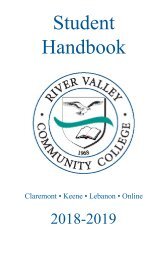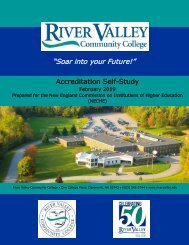You also want an ePaper? Increase the reach of your titles
YUMPU automatically turns print PDFs into web optimized ePapers that Google loves.
with us to determine that the consultant has all the relevant facts. To our knowledge,<br />
there were no such consultations with other accountants.<br />
Other Audit Findings or Issues<br />
We generally discuss a variety of matters, including the application of accounting principles<br />
and auditing standards, with management each year prior to retention as CCSNH’s auditor.<br />
However, these discussions occurred in the normal course of our professional relationship<br />
and our responses were not a condition to our retention.<br />
We applied certain limited procedures to the Management’s Discussion and Analysis and<br />
the supplementary information related to CCSNH’s pension and other postemployment<br />
benefits plans, which are required supplementary information (RSI) that supplements the<br />
basic financial statements. Our procedures consisted of inquiries of management regarding<br />
the methods of preparing the information and comparing the information for consistency<br />
with management’s responses to our inquiries, the basic financial statements, and other<br />
knowledge we obtained during our audit of the basic financial statements. We did not audit<br />
the RSI and do not express an opinion or provide any assurance on the RSI.<br />
We were engaged to report on the Schedule of Expenditures of Federal Awards, which<br />
accompany the financial statements but are not RSI. With respect to this supplementary<br />
information, we made certain inquiries of management and evaluated the form, content,<br />
and methods of preparing the information to determine that the information complies with<br />
U.S. generally accepted accounting principles or Uniform Guidance, the method of<br />
preparing it has not changed from the prior period, and the information is appropriate and<br />
complete in relation to our audit of the financial statements. Our procedures included<br />
comparing and reconciling the supplementary information to the underlying accounting<br />
records used to prepare the financial statements or to the financial statements themselves.<br />
172 | P a g e<br />
PART II – INTERNAL CONTROL MATTERS<br />
In planning and performing our audit of the financial statements of CCSNH as of and for<br />
the year ended June 30, 2018, in accordance with U.S. generally accepted auditing<br />
standards, we considered CCSNH’s internal control over financial reporting (internal<br />
control) as a basis for designing audit procedures that are appropriate in the<br />
circumstances for the purposes of expressing our opinions on the financial statements, but<br />
not for the purpose of expressing an opinion on the effectiveness of CCSNH’s internal<br />
control. Accordingly, we do not express an opinion on the effectiveness CCSNH’s internal<br />
control.<br />
A deficiency in internal control exists when the design or operation of a control does not<br />
allow management or employees, in the normal course of performing their assigned<br />
functions to prevent, or detect and correct, misstatements on a timely basis. A material<br />
weakness is a deficiency, or a combination of deficiencies, in internal control, such that<br />
there is a reasonable possibility that a material misstatement of the entity’s financial<br />
statements will not be prevented, or detected and corrected, on a timely basis.<br />
Our consideration of internal control was for the limited purpose described in the first<br />
paragraph of this section and was not designed to identify all deficiencies in internal<br />
control that might be material weaknesses. Given these limitations, during our audit we





